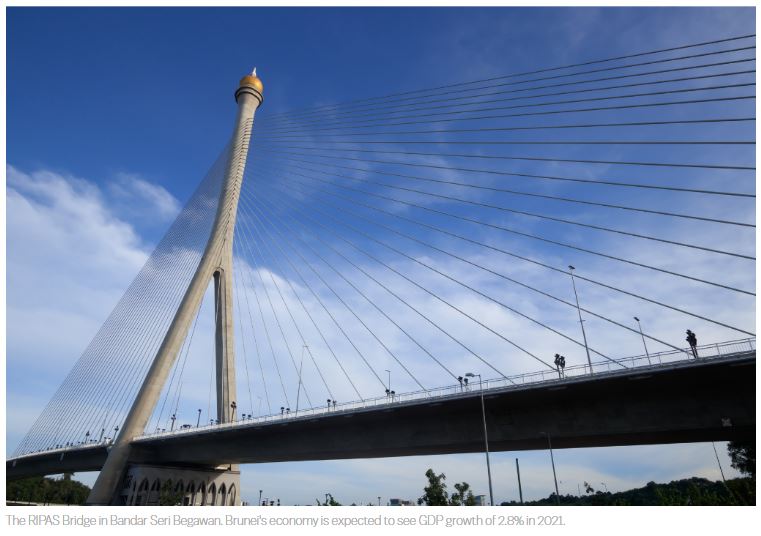Brunei economy forecast to grow 2.8% in 2021
BANDAR SERI BEGAWAN – The Brunei economy is projected to expand 2.8 percent in 2021, led by downstream exports and the manufacturing sector, according to the think tank Centre for Strategic and Policy Studies (CSPS).
On the back of an estimated 0.7 percent growth in 2020, the Brunei economy is expected to improve in 2021 supported by output from Hengyi Industries’ new petrochemical plant on Pulau Muara Besar, CSPS stated in its first annual flagship publication Brunei Economic Outlook 2021.
Record-low oil prices triggered by the COVID-19 pandemic had put a dent in last year’s GDP growth after registering a 13-year high of 3.9 percent economic growth in 2019.
However, the predicted growth rate of 2.8 percent does not take into account global economic uncertainties, the risk of new waves of COVID-19 infections and unanticipated domestic oil and gas supply disruptions.
CSPS said the economic forecast is subject to several factors, including actions taken to contain the COVID-19 pandemic and the rollout of an effective vaccine.
“A weaker than anticipated global recovery also means that energy prices will remain lower for longer, dealing a double whammy to Brunei’s exports and government revenue.
“This could adversely affect government spending, with negative spillovers to the non-oil and gas sector,” the report read.

Energy sector fuel hopes of recovery
CSPS forecasts the oil and gas sector to grow three percent in 2021, after contracting 5.8 percent last year.
The growth would be driven by an increase in supply, with crude oil production estimated at 140,000 barrels per day and LNG production at 947,000 million British thermal units per day (mmbtu/d).
Brunei had reported its second lowest quarterly oil output in the third quarter of 2020, falling to 101,000 barrels per day due to lacklustre demand and as part of historic production cuts agreed with OPEC Plus.
CSPS said crude oil production has been on a declining trend since 2006.
“Unanticipated disruptions in production due to mature oil and gas fields have hampered the sector’s growth.
“Maintenance and rejuvenation works of ageing offshore facilities have helped restore a gradual increase in production in recent years. However, a prolonged period of low oil prices could weaken the commercial viability to further increase production,” the report continued.

While commodity prices are likely to remain below pre-pandemic levels, CSPS predicts a slight recovery of oil prices in 2021.
Brent Crude — the international benchmark for oil prices – is projected to average US$50.8 per barrel in 2021, up from US$41.3 per barrel last year.
The rebound in oil prices has been limited by subdued demand as a result of international travel restrictions, the report stated.

Downstream sector set to continue strong performance
The economic outlook of the downstream sector – consisting of the production of fertilisers and petrochemical products – remains positive with a projected growth of 12 percent in 2021.
The sector had been thriving with a 284 percent growth last year, mainly driven by Hengyi Industries’ export of petrochemical products.
Since Hengyi started operating its oil refinery in November 2019, the downstream sector has been the top performer in Brunei’s economy.
Hengyi recorded revenues of up to US$3.5 billion in 2020 after exporting over 6.38 million tonnes of petroleum products and 1.7 million tonnes of petrochemical products, according to figures from Hengyi.
Adding to its initial investment of US$3.45 billion, the Brunei-China joint venture is expected to fund another US$13.65 billion in the second phase of its oil refinery expansion.
CSPS said production of petrochemical products had slowed since Q2 2020 due to weak appetite, but demand is expected to pick up this year as the global economy recovers.
The start of Brunei Fertilizer Industries‘ production of ammonia and urea in mid-2021 will further boost the downstream sector’s output, it added.
Services sector rally on the horizon
The non-oil and gas sector is expected to climb 1.3 percent this year, after a marginal decline of 0.1 percent in 2020.
Most service sub-sectors have been forecast to recover modestly after COVID-19 measures restricted certain economic activities in Q2 2020.
However, quick recovery in tourism and travel is unlikely as international travel restrictions will remain in place until the pandemic has been brought under control across the world.
Tourist arrivals had been on an upward trend before a sharp fall of 70 percent last March.
There were also major losses for the air transport sector, which plunged 93.1 percent in Q2 2020.
Source: https://thescoop.co/2021/02/02/csps-forecasts-2-8-economic-growth-in-2021/


 English
English





